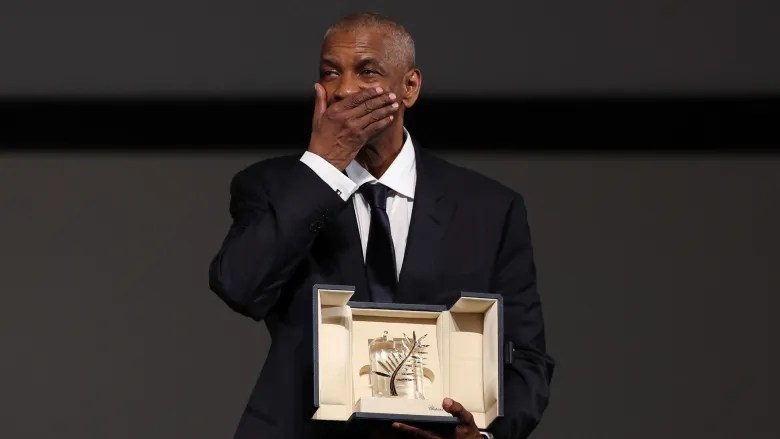In a moment as cinematic as any of the performances he’s given, Denzel Washington stood before a full house at the Grand Théâtre Lumière, flanked by longtime partner Spike Lee and the cast of his latest film Highest 2 Lowest, to accept the Honorary Palme d’Or at the 2025 Cannes Film Festival. Visibly moved, Washington’s eyes welled as the auditorium rose to its feet—an ovation not just for a singular film, but for a lifetime of performances that have transformed the screen, elevated the medium, and challenged the boundaries of narrative power.
This honor, reserved for those whose contributions to global cinema transcend time and place, marked a milestone that even Washington, with his many accolades, did not anticipate. “I’ve been fortunate in my career,” he told the Cannes crowd, voice thick with emotion. “But I didn’t expect this.” And yet, perhaps no actor is more deserving of Cannes’ highest tribute to artistic legacy.
A Career Sculpted in Stone and Fire
Denzel Washington’s cinematic career cannot be summed up with mere superlatives. Born in Mount Vernon, New York, in 1954, Washington came of age in the theatre, finding discipline and depth in roles ranging from Eugene O’Neill to Shakespeare before transitioning to the screen in the early 1980s. What followed was a succession of roles so precise, so layered, that they redefined the possibilities of character portrayal in American cinema.
From the humanist clarity of Cry Freedom (1987), where he portrayed South African activist Steve Biko, to the torrid moral tension of Training Day (2001), where his Alonzo Harris became one of the most iconic anti-heroes in film history, Washington has never settled for ease. His performances invite discomfort, insist on nuance, and refuse compromise. He has played saints, sinners, soldiers, and every moral shade in between, each time infusing his characters with dignity, humanity, and unfailing complexity.
Yet what makes Washington’s legacy more than just a sum of great performances is his ability to channel broader cultural, political, and historical forces through the individual stories he chooses. His characters do not float in abstract space; they are grounded in the urgent soil of America’s past and present—carrying with them questions of justice, race, faith, masculinity, and redemption.
A Cannes Homecoming, Years in the Making
Though Cannes is often associated with European auteurs and foreign-language prestige, its Honorary Palme d’Or has gradually evolved into a global acknowledgment of cinematic greatness. First awarded in 2002, the prize has been granted to luminaries such as Agnès Varda, Jean-Luc Godard, and Jane Fonda. In 2023, Harrison Ford accepted the honor. This year, it was Denzel Washington’s turn.
The symbolism was powerful. Spike Lee—who directed Washington in some of his most enduring work, including Mo’ Better Blues, He Got Game, and Malcolm X—delivered the award in a speech both celebratory and reverent. “Denzel doesn’t act. He embodies. He doesn’t perform—he becomes,” Lee said, underscoring the actor’s gift for emotional saturation. It was a full-circle moment: two giants of Black American cinema, on the international stage, revisiting decades of connection, friendship, and artistic rebellion.
Their presence at Cannes also came with the premiere of Highest 2 Lowest, a genre-defying drama that marks Washington’s return to form as both actor and producer. The film, a layered portrait of ambition and fallout in the world of elite finance, received a seven-minute standing ovation—further proof that at 70, Washington continues to evolve as a performer while nurturing younger talent through his production company, Mundy Lane.
A Cultural Force Beyond the Frame
What sets Washington apart from many of his contemporaries is his refusal to dilute gravitas. In an era that often favors irony or spectacle, his acting remains deeply committed to seriousness of purpose. He does not “entertain” in the conventional sense; he arrests. He holds space for difficult truths. In films like Fences (2016), where he also directed, or The Book of Eli (2010), where post-apocalyptic terrain becomes a platform for spiritual resilience, Washington turns cinema into ritual.
But his influence extends beyond performance. Washington’s mentorship of young actors—including John David Washington, his son and star of Tenet and BlacKkKlansman—is well documented. His role as a producer, director, and cultural commentator makes him one of the rare actors whose impact is as expansive off-screen as it is on it. From his early donations to Black theatre programs to his advocacy for behind-the-camera diversity, Washington has helped construct a broader scaffolding for inclusion in the film industry.
His directorial work, especially, shows a commitment to intergenerational dialogue. Antwone Fisher (2002), The Great Debaters (2007), and A Journal for Jordan (2021) reflect an interest in ordinary Black lives made extraordinary by introspection, resilience, and love. These films resist Hollywood’s tendency to flatten Black experience into archetype or trauma. Instead, Washington opts for depth, contradiction, and grace.
Honors and the Meaning of Legacy
It is easy to count Washington’s awards: two Academy Awards, three Golden Globes, a Tony for his performance in Fences, and now the Cannes Honorary Palme d’Or. But the more essential legacy lies not in the trophies, but in the stories he helped tell—and the way he told them.
Each time Washington appears on screen, he brings with him the weight of every role that preceded it. Yet he never repeats himself. His performances do not blur into each other; they form a lineage. You can see the echoes of Malcolm X in The Equalizer, just as you can feel the righteousness of Glory in the restrained defiance of Flight. The career is not a collection but a continuum, always reaching, always refusing the safety of typecasting.
This is what Cannes sought to honor: not just Washington’s contributions to film, but his contribution to culture. In a festival often accused of Eurocentrism, the honoring of Washington represents a globalizing gesture, an acknowledgment that the soul of cinema is just as much in Harlem as it is in Paris, just as much in Compton as in Cannes.
Looking Ahead While Honoring the Past
Highest 2 Lowest, directed by newcomer Amina Raine with Washington in a co-producing and starring role, signals the beginning of a new chapter. Not content to rest on laurels, Washington is now positioning himself as a bridge between cinematic generations. In interviews following the premiere, he emphasized his desire to “build tables, not just get a seat at them.”
With plans already underway for a directorial adaptation of August Wilson’s Joe Turner’s Come and Gone, and a rumored blend with director Barry Jenkins, Washington is once again stepping forward as an architect of cultural memory and innovation.
But on the Cannes stage, for one evening at least, Washington allowed himself a moment of stillness. A rare pause in a career of motion, intensity, and discipline. As the festival lights softened and the applause rang out, the man who has played kings, cops, preachers, addicts, lawyers, assassins, and activists stood simply as himself: a son, a father, a believer in craft and truth.
A Moment in History
Cannes 2025 will be remembered for many things. Breakout debuts, political polemics, extravagant gowns. But above all, it will be remembered for this: Denzel Washington standing on the Grand Théâtre Lumière stage, receiving one of cinema’s greatest honors with quiet humility, a tear in his eye, and Spike Lee by his side.
It was a moment that did not need to be dramatized. It already was. A script written not in ink, but in decades of discipline, thousands of hours of rehearsal, and roles that shaped a generation.
A moment when cinema bowed not just to talent—but to excellence. To presence. To history. And to Denzel.
No comments yet.







